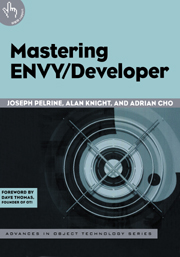Book contents
- Frontmatter
- Contents
- Foreword
- Acknowledgments
- Introduction
- Chapter 1 Getting Started
- Chapter 2 Basic Concepts
- Chapter 3 Team Development
- Chapter 4 Advanced Development
- Chapter 5 Formal Concepts
- Chapter 6 Packaging and Delivery
- Chapter 7 Extending the System
- Chapter 8 Administration
- Chapter 9 Goodies
- Chapter 10 Troubleshooting
- Appendix: A Selected Annotated API of ENVY System Classes
- Glossary
- References
- Index
Introduction
Published online by Cambridge University Press: 11 January 2010
- Frontmatter
- Contents
- Foreword
- Acknowledgments
- Introduction
- Chapter 1 Getting Started
- Chapter 2 Basic Concepts
- Chapter 3 Team Development
- Chapter 4 Advanced Development
- Chapter 5 Formal Concepts
- Chapter 6 Packaging and Delivery
- Chapter 7 Extending the System
- Chapter 8 Administration
- Chapter 9 Goodies
- Chapter 10 Troubleshooting
- Appendix: A Selected Annotated API of ENVY System Classes
- Glossary
- References
- Index
Summary
Smalltalk was first built as a personal computing environment. Most systems at that time were time-sharing, with character-based terminals. In contrast, Smalltalk provided a high-resolution graphical screen and a mouse to maximize the power available to the one user actually sitting at the machine. Smalltalk was designed so that every component in the system was accessible to the user and could be understood by one person.
This was an outstanding vision, and one that remains both important and ahead of the mainstream even today. However, this emphasis on the personal meant that cooperative development issues were less well represented.
Individuals could be incredibly productive, but the code resided in each developer's image and was not directly visible to other team members. The code could be filed out and exchanged between developers but on an ad hoc basis. The way Smalltalk represented code, and the development practices that Smalltalk encouraged were not a good match for the file-based version control systems of the day. As Smalltalk became more widely used in industry, the need for support of large teams became more critical.
Different schemes were attempted that built relatively lightweight Smalltalk layers on top of existing team programming systems. Finally, in the mid-1980s, Carleton University Professor Dave Thomas and some of his students broke the mold and came up with Orwell, a repository-based system that was tightly integrated with the Smalltalk environment.
- Type
- Chapter
- Information
- Mastering ENVY/Developer , pp. xxi - xxviPublisher: Cambridge University PressPrint publication year: 2001



